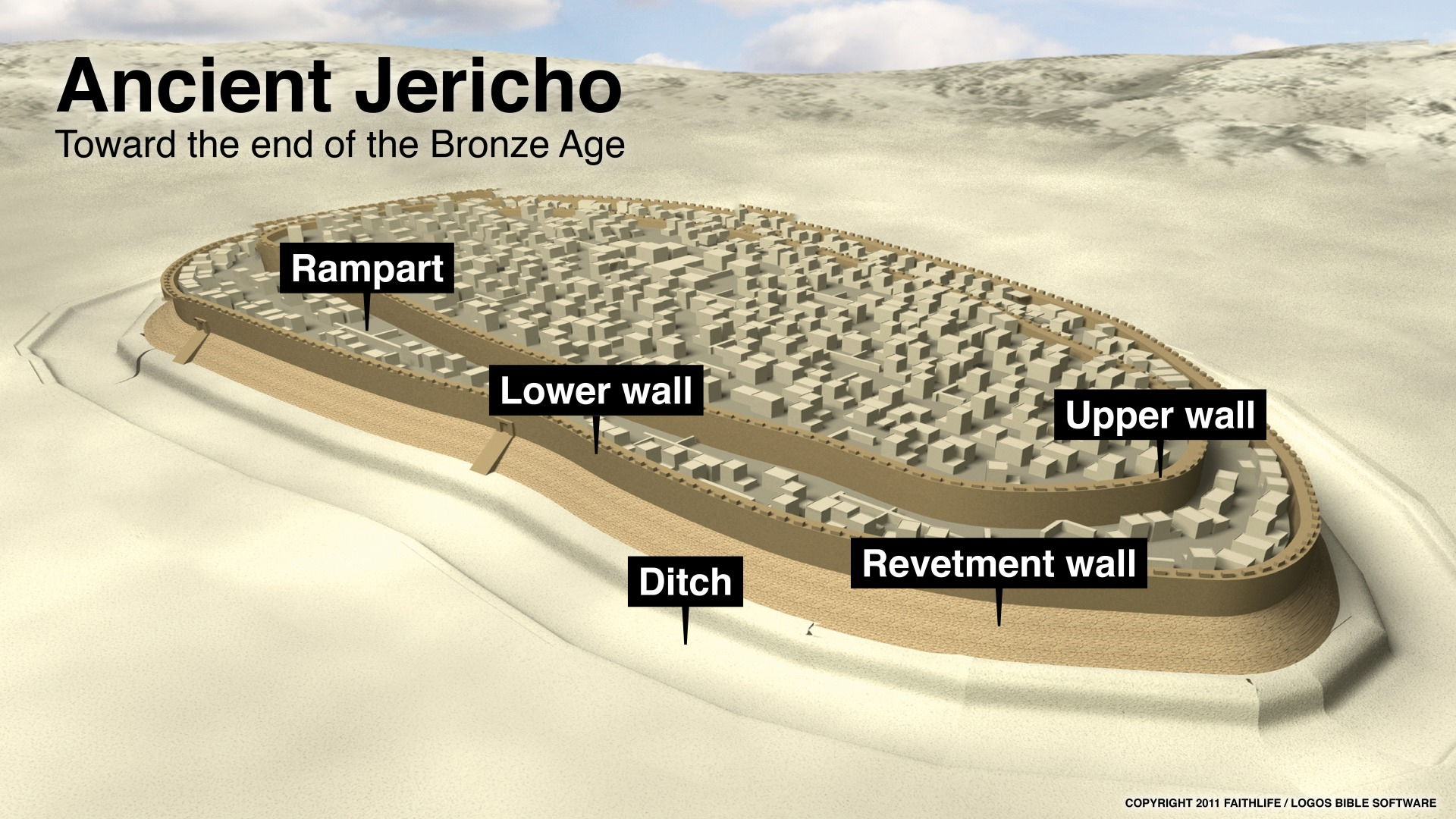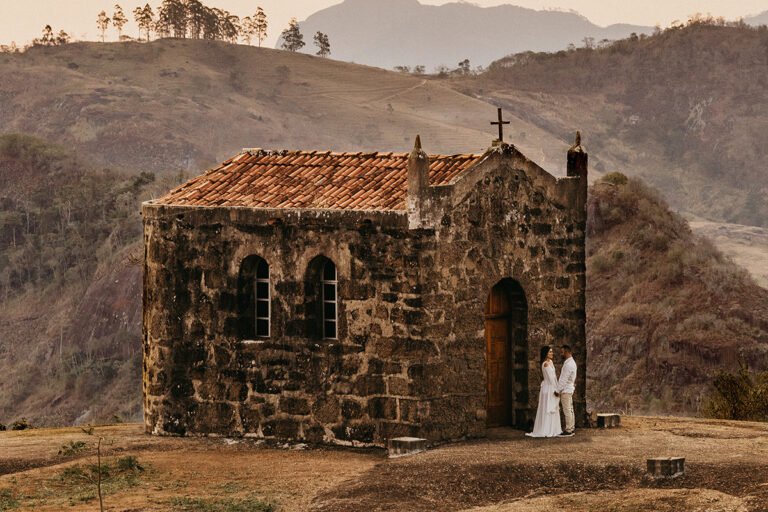Joshua 6 Commentary
Joshua 6 is one of the most vivid demonstrations of God’s power in the Old Testament.
The Israelites spent 40 years wandering in the desert. Moses is no longer their leader; Joshua has taken over. They now find themselves near the Jordan River, on the edge of their land. Around 500 years ago, God had promised Abraham that his descendants would settle in this very place. If the challenging desert phase wasn’t tough already, they now face impending wars and close combat to claim what has been promised to them.
The challenge they faced was undoubtedly enormous, with the city of Jericho posing as their primary hurdle. Recent archaeological findings suggest that the walls of Jericho stood at a formidable height of 11 feet and had a depth of 14 feet. Additionally, strategically constructed sloped angles at 35 degrees made it virtually impossible to breach the walls. Jericho was notorious for its impenetrability.

Cities in ancient warfare were either conquered through direct assault or, more frequently, by imposing starvation on the inhabitants inside until they surrendered. During these sieges, the victorious army would often encircle the city’s stone walls and employ tactics such as burning them or digging tunnels underneath to weaken their defenses. These methods of warfare could take weeks, if not months, to accomplish. However, while these prolonged sieges persisted, the attacking army would often suffer heavy casualties as they attempted these strategies, falling victim to arrows, boulders, or any other projectiles hurled at them from the safety of the city walls.
Here in Joshua 6, God was about to do something different and act in a way that required obedience to what He instructed for them to find victory. The plan would sound absolutely foolish (to man), and when the dust settled (literally) it wouldn’t take weeks but seven days leaving everyone in the surrounding nations astonished and full of fear of the Israelites and their God.
The City of Jericho
Jericho, an ancient city with a rich history, is situated close to the Ein es-Sultan spring. This spring has the impressive capacity to produce 1000 gallons of water per minute. Remarkably, Jericho is known as the lowest city on Earth, lying approximately 850 feet below sea level. You can imagine how fertile the land is with that combination.
It is recognized as one of the oldest cities still in existence today, with 20 different successive settlements unearthed by archaeologists. Ongoing excavations consistently uncover extraordinary artifacts that provide evidence supporting the Biblical narratives associated with this renowned city.
Strategy
Let’s consider the big picture strategy. God is going to divide the land and divide the enemy. He’s going to lead Israel to take each piece one-by-one. This will be a piecemeal process. What is the definition of piecemeal? “In an unsystematic way (I would say this strategy of marching around Jericho is unsystematic) partial measures taken over a period of time.” Partial measures taken over a period of time.
The big picture strategy began with controlling Jericho and getting a foothold in the center of Canaan which divided the land into two chunks between the north and the south. From there, Joshua would lead his men on a campaign to the south and then to the north. This strategy effectively prevented the Canaanite cities from uniting against Israel. It’s interesting to consider that this military tactic would become a popular one being used in every major war.
The specific strategy used against the city of Jericho would be one that would require an incredible amount of trust and discipline.
God instructed His people to march around a city for seven consecutive days, playing their horns. The first six days were to be done in silence, while on the seventh day, they were to walk around the city seven times, shout, and miraculously, the heavily fortified city would open up before them. Completely unsystematic, right? Piecemeal and unsystematic. Those are good words to describe the God I have come to know!
The primary ingredient Israel needed in order to move forward in their relationship with God was long-term dependence.
The Process
The plan was set. The priests, the soldiers, and the people took their places early in the morning. They began to walk in silence just as Joshua had commanded them. No one was to say a word. The only sound heard the first six days was the trumpet blast of seven priests with seven ram horns. Patiently and methodically, this caravan slogged around the city landscape carrying the ark of the covenant by their side.
Jericho wasn’t a huge city, so it’s possible the beginning of this motorcade was already back at camp as some of the stragglers in the back had begun their trek. From Jericho, this may have formed a ring around the city, striking fear, paranoia, and confusion into those dwelling within the walls.
It would be the seventh and final day, Joshua led his people around the city seven times and with one final trumpet blast, Joshua declared the city captured and the people gave out a shout of victory. The walls of Jericho fell straight down into the earth and Israel claimed the first of their Promised Land.
A familiar story no doubt, but what does it mean for us today?
Three Phases
- The long six day march in silence.
- The seventh day march of seven times with the shout of victory.
- The promise delivered.
If you asked believers today, many would tell you what they remember most about this story is the seventh day and the promise delivered. Most people don’t remember the six days of silent dependence on God that Israel committed to.
In order to live a fruitful life, we must stick to our duties and leave the big events up to God. Israel was NEVER going to take down Jericho on their own. Some of us are (metaphorically) staring down the walls of Jericho right now, and just like Israel, we will never conquer it with our own strength or intelligence.
This is what separated Israel from all other nations of that time. The Canaanites would say, “I want that land, may the gods bless me as I go try and take it.” That is the way of the world in secular society today. “Bless my own efforts.” Israel (Joshua specifically) said, “God what would you have us do to take that land?” Do you see the difference?
One is dependence on self, the other is dependence on God. One is “my will be done,” the other is “God’s will be done.” One is, “God come join me in what I want to do,” the other is, “God I want to join You in what You are doing.” Will you say today, “I want to join God in what He is doing in all areas of my life?” If so, what tangible evidence is there in your daily life that illustrates this?
Where have we settled for instant gratification instead of a long-term commitment to dependence on God, even when it seems repetitive, unsystematic, or fruitless?
Look, we are stubborn people. We do things out of our flesh without even knowing it. We naturally depend on ourselves. We can relate to Israel. The truth (for them and us) is that there were six days of silence before the seventh day of victory. Six silent days of trust and dependence on God. Where do you need to hear and apply this in your life right now?




